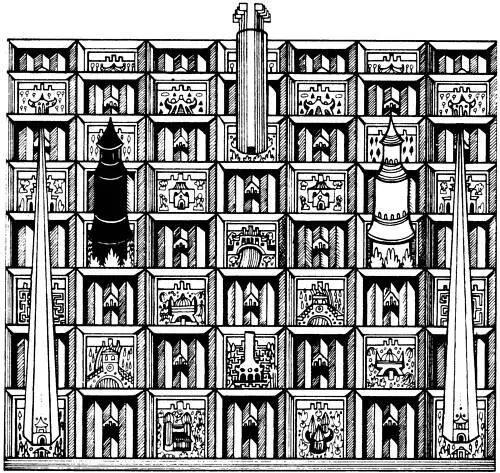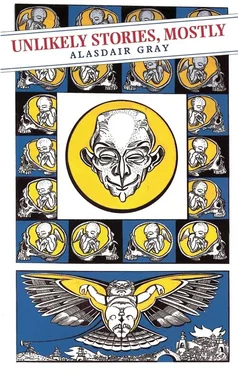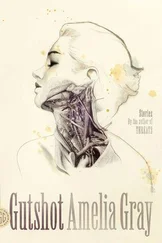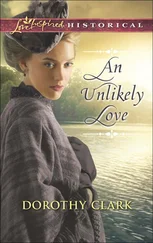The janitor struck his gong then asked in his own voice if we had any polite requests. I looked round the hall. I stood alone, for at the sound of the emperor’s voice all but the janitor and I had lain face down on the carpet and even the janitor had sunk to his knees. Tohu and the entourage sat up now and watched me expectantly. Adoda arose with her little spoon and bottle and carefully collected from my cheeks the sacred tears of joy which spring in the eyes of everyone the emperor addresses. Tohu’s nurse was licking his tears off the carpet. I envied him, for he would see more of the palace than I would, and be more ready to write a poem about it when the order came. I did not want to visit the market but I ached to see the treasuries and reservoirs and grain-silos, the pantechnicons and pantheons and gardens of justice. I wondered how to learn about these and still stay at home. The new dictionary of etiquette says All requests for knowledge will be expressed as requests for things . So I said, “May the bare walls of this splendid hall be decorated with a map of the new palace? It will help my colleague’s chef to lead him about.”
Tohu shouted, “Do not speak for me, Bohu! The emperor will send janitors to lead the chef who leads me. I need nothing more and nothing less than the emperor has already decided to give.”
The janitor ignored him and told me, “I hear and respect your request.”
According to the new dictionary of etiquette this answer means No or Maybe or Yes, after a very long time .
The janitor left. I felt restless. The chef’s best tea, the doctor’s drugs, Adoda’s caresses had no effect so I climbed into the observatory and tried to quieten myself by watching the stars as the emperor had commanded. But that did not work, as he foresaw, so I summoned my secretary and dictated this letter, as he advised. Don’t be afraid to read it. You know what the emperor said. And the postman who rewrites letters before fixing them to the pigeons always leaves out dangerous bits. Perhaps he will improve my prose-style, for most of these sentences are too short and jerky. This is the first piece of prose I ever composed, and as you know, I am a poet.
Goodbye. I will write to you again ,
From the evergreen garden ,
Your son , Bohu.
DICTATED ON THE 27th LAST DAY OF THE OLD CALENDAR.

SECOND LETTER
DEAR MOTHER, DEAR FATHER, I discover that I still love you more than anything in the world. I like my entourage, but they are servants and cannot speak to me. I like the headmaster of literature, but he only speaks about poetry. I like poetry, but have written none. I like the emperor, but have never seen him. I dictated the last letter because he said talking to you would cure my loneliness. It did, for a while, but it also brought back memories of the time we lived together before I was five, wild days full of happiness and dread, horrid fights and ecstatic picnics. Each of you loved and hated a different bit of me.
You loved talking to me, mother, we were full of playful conversation while you embroidered shirts for the police and I toyed with the coloured silks and buttons. You were small and pretty yet told such daring stories that your sister, the courtesan, screamed and covered her ears, while we laughed till the tears came. Yet you hated me going outside and locked me for an hour in the sewing box because I wore my good clogs in the lane. These were the clogs father had carved with toads on the tips. You had given them many coats of yellow lacquer, polishing each one till a member of the honoured-guest-class thought my clogs were made of amber and denounced us to the police for extravagance. But the magistrate was just and all came right in the end.
Mother always wanted me to look pretty. You, father, didn’t care how I looked and you hated talking, especially to me, but you taught me to swim before I was two and took me in the punt to the sewage ditch. I helped you sift out many dead dogs and cats to sell to the gardeners for dung. You wanted me to find a dead man, because corpse-handlers (you said) don’t often die of infectious diseases. The corpse I found was not a man but a boy of my own age, and instead of selling him to the gardeners we buried him where nobody would notice. I wondered why, at the time, for we needed money for rent. One day we found the corpse of a woman with a belt and bracelet of coins. The old capital must have been a slightly mad place that year. Several corpses of the honoured-guest-class bobbed along the canals and the emperor set fire to the south-eastern slums. I had never seen you act so strangely. You dragged me to the nearest market (the smell of burning was everywhere) and rented the biggest possible kite and harness. You who hate talking carried that kite down the long avenue to the eastern gate, shouting all the time to the priest, your brother, who was helping us. You said all children should be allowed to fly before they were too heavy, not just children of the honoured-guest-class. On top of the hill I grew afraid and struggled as you tightened the straps, then uncle perched me on his shoulders under that huge sail, and you took the end of the rope, and you both ran downhill into the wind. I remember a tremendous jerk, but nothing else.
I woke on the sleeping-rug on the hearth of the firelit room. My body was sore all over but you knelt beside me caressing it, mother, and when you saw my eyes were open you sprang up, screamed and attacked father with your needles. He did not fight back. Then you loved each other in the firelight beside me. It comforted me to see that. And I liked watching the babies come, especially my favourite sister with the pale hair. But during the bad winter two years later she had to be sold to the merchants for money to buy firewood.
Perhaps you did not know you had given me exactly the education a poet needs, for when you led me to the civil service academy on my fifth birthday I carried the abacus and squared slate of an accountant under my arm and I thought I would be allowed to sleep at home. But the examiner knew his job and after answering his questions I was sent to the classics dormitory of the closed literature wing and you never saw me again. I saw you again, a week or perhaps a year later. The undergraduates were crossing the garden between the halls of the drum-master who taught us rhythms and the chess-master who taught us consequential logic. I lagged behind them then slipped into the space between the laurel bushes and the outside fence and looked through. On the far side of the freshwater canal I saw a tiny distant man and woman standing staring. Even at that distance I recognized the pink roses on the scarlet sleeves of mother’s best petticoat. You could not see me, yet for a minute or perhaps a whole hour you stood staring at the tall academy fence as steadily as I stared at you. Then the monitors found me. But I knew I was not forgotten, and my face never acquired the haunted, accusing look which stamped the face of the other scholars and most of the teachers too. My face displays the pained but perfectly real smile of the eternally hopeful. That glimpse through the fence enabled me to believe in love while living without it, so the imagination lessons, which made some of my schoolmates go mad or kill themselves, did not frighten me.
The imagination lessons started on my eleventh birthday after I had memorized all the classical literature and could recite it perfectly. Before that day only my smile showed how remarkable I was. The teachers put me in a windowless room with a ceiling a few inches above my head when I sat on the floor. The furniture was a couple of big shallow earthenware pans, one empty and one full of water. I was told to stay there until I had passed the water through my body and filled the empty pan with it. I was told that when the door was shut I would be a long time in darkness and silence, but before the water was drunk I would hear voices and imagine the bodies of strange companions, some of them friendly and others not. I was told that if I welcomed everyone politely even the horrible visitors would teach me useful things. The door was shut and the darkness which drowned me was surprisingly warm and familiar. It was exactly the darkness inside my mother’s sewing-box. For the first time since entering the academy I felt at home.
Читать дальше













